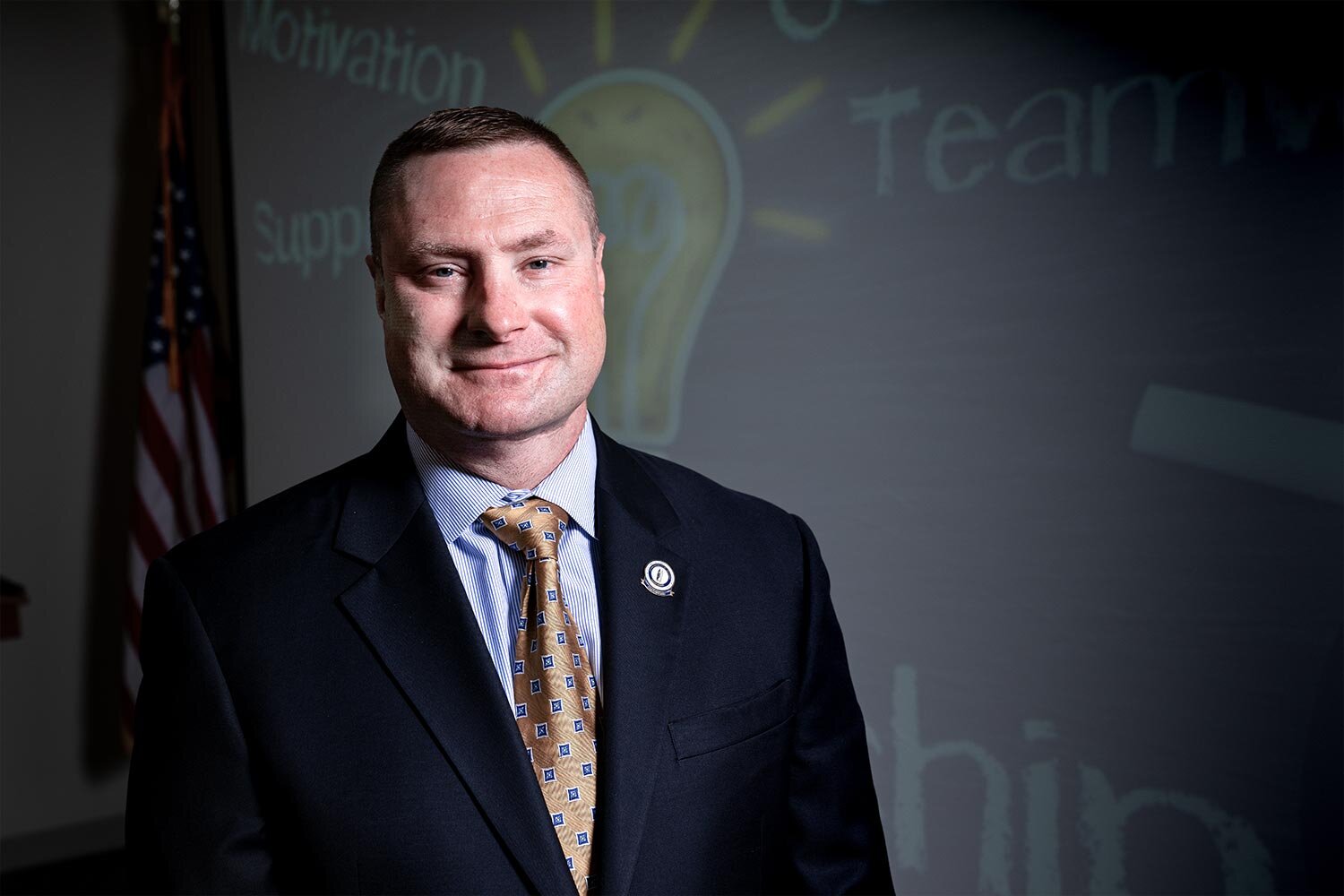DOCJT Leading Officers to Success
Influencing others. According to Department of Criminal Justice Training Leadership Section Supervisor Chip White and Instructor Ed Lingenfelter, that’s the simple definition of leadership.
“You are trying to influence people to reach organizational goals, and preferably it’s because they want to reach them and not because you are forcing them,” explained White. “It can be harder than it sounds in law enforcement because of what you do daily. There can be ramifications, not just on the officer, but also for the agency, the city, county and the profession. Decisions being made are critical, so it’s essential for someone to be using leadership influence to make sure those things are being done in a right and ethical way.”
Yet, while leadership isn’t easy, DOCJT has been preparing all law enforcement levels for the role both in their agency and their communities since the 1990s. This began with establishing the Criminal Justice Executive Course (CJED), one of the many pieces that now make up the department’s Leadership Section offerings.
Department of Criminal Justice Training Leadership Section Supervisor Chip White. (Photo by Jim Robertson)
From Beginnings to Achievements
Having grown to meet the commonwealth’s needs, the Leadership Section now teaches 11 courses, not including those offered to the Basic Training Academy.
By teaching a few instruction blocks to basic training recruits, the Leadership Section can instill vital principles early in each participant’s career. One specific block focuses on ethics.
We talk about integrity,” said White. “The cliché definition of integrity is doing the right thing, and often we bring up that it’s the hardest to say something when everyone is watching. It’s hard to stand up in front of a group of your peers and say something’s not right, but that’s what a police officer has to do.”
Among the other courses are four pillar programs that have become statewide, law enforcement traditions:
Academy of Police Supervision (APS)
Criminal Justice Executive Course (CJED)
Current Leadership Issues for Mid-Level Executives (CLIME)
Police Executives Command Course/Sheriff’s Executive Command Course (PECC/SECC)
According to Lingenfelter, APS is for sergeants or first-line supervisors up to chiefs and sheriffs. The three-week course is a deep dive on how to influence groups of people and how to become a better person, as well as how to apply situational leadership, demonstrate an understanding of constitutional and administrative law, emotional and social intelligence, ethical decision making, problem solving, emotional survival, and public speaking.
In CJED, participants focus on the mechanics of management, budgeting, planning, interacting with the community; communicate in writing and personnel administration.
Police Executive Command Consortium (PECC), the oldest in-service class in the commonwealth, and Current Leadership Issues for Mid-Level Executives (CLIME) are offered as executive conferences that build technical, human and conceptual skills, Lingenfelter added.
One unique aspect of leadership training at DOCJT is the utilization of a challenge/ropes course, which Lingenfelter calls a Leadership Laboratory.
“It’s a crawl, walk, run-type scenario,” he said of the course. “We use the principles of situational leadership … We give them a scenario where they must function as a team, but who is going to allow themselves to be led and not always have to have the last word or the best idea? Because somebody may have a better idea than you. Then we add in the physical component with critical thinking while still being able to influence people and accomplish the task.”
Department of Criminal Justice Training Leadership Section Instructor Ed Lingenfelter. (Photo by Jim Robertson)
Principles with a Purpose
“Know thyself,” said Lingenfelter when asked about the key principles taught in leadership. “I tell everybody that there is nothing complex about leadership. It boils down to if you are a good person. If you are not a good person, you will not be a good anything. You will not be a good parent, coach, spouse or teacher, and you definitely will not be a good leader.”
DOCJT Leadership courses touch on many growth areas, such as the importance of emotional intelligence and how participants treat other people.
“Leadership is a relationship,” elaborated White. “And so like any relationships, if you treat people badly, that has a real impact on people. In our classes, we talk about how through leadership or lack of leadership, you can really make someone have a great day or go home and have a (bad) day because of something you have done. So you are having a real cause and effect on people’s lives.”
Never Stop Growing
Regardless of where someone falls on their agency’s organizational chart, they have the potential to grow as a leader, both at work, in their community and their home. The trick is never to stop trying to improve and educate themselves, said the law enforcement professionals.
“Not every reader is a leader, but every leader is a reader,” said Lingenfelter. “You have to be able to expand your mindset. If you don’t read and engage people in conversation, not to talk, because when you talk, you repeat what you already know, but to engage a person in conversation to listen to them, you can learn a whole lot from them and reading does that for you as well.
“Failing to prepare is preparing to fail,” he said on the importance of continued leadership training. “That’s the reason why, unlike a lot of places, the commonwealth is heavily invested in leadership (training) for public safety.”
For more information about the DOCJT Leadership Section and the courses they provide, visit https://www.docjt.ky.gov/leadership.






